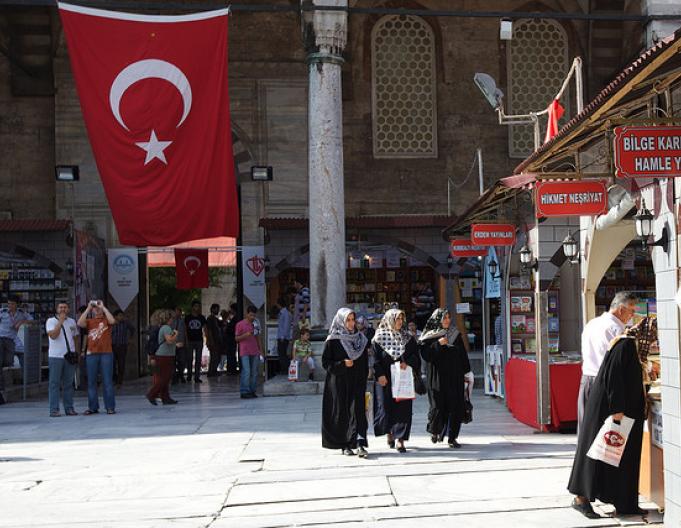Murders of women, often at the hands of ex-lovers or husbands, appear to be on the rise in Turkey. Rights activists say many of the killings could be prevented – if only authorities paid more attention to cries for help.
On sick leave for a month, Filiz Akdogan is making a point of not staying shut up in her apartment. On this day, she is dealing with her trauma by surrounding herself with friends and colleagues in a hairdressing salon in Maltepe, a lively district located on Istanbul’s Asian shoreline. Still, she moves slowly so as not to revive the pain.
Three weeks ago, Akdogan, a pretty 27-year-old redhead with green eyes, was cutting a customer’s hair when she was suddenly attacked by her ex-husband. Using a screwdriver as a weapon, the man stabbed her repeatedly – in the stomach, lungs and an armpit. Akdogan survived only because her boss came to her rescue.
Akdogan divorced her husband two years ago, and had feared such an attack ever since. Twice the man uttered death treats, which she reported to the police, only to be told “not to worry.”
“If he really intended to kill you, he would have done it already,” they said.
After the attack, Akdogan’s brother stood guard 24 hours a day in front of her hospital room. “I was not given police protection and my family was worried that he might come back,” says Akdogan. Police did eventually arrest the ex-husband. Akdogan worries, though, that he won’t stay locked up for long. “What will happen then?” she whispers.
A website called Bianet, which provides daily specialized coverage focusing on human rights, combed through local newspapers to discover that between February and March alone, 52 women were killed in Turkey. The macabre figure corresponds with Justice Ministry statistics, which show that the number of premeditated female homicide victims rose 14-fold between 2002 and 2009, from 66 to 953.
Do these dramatic numbers reflect a real increase in murders? Or are they instead an indication that authorities are paying increasing attention to the phenomenon? Probably both, observers say. Today, honor killings and spousal murders do draw more public attention than in the past. But women’s rights associations are also convinced the incidence of violence itself is increasing. Last year, they point out, 27% of female homicide victims were killed after seeking a divorce. “They are more exposed to violence because they want to gain their freedom,” says lawyer Esra Bas.
Akdogan’s experience was a case in point. “My ex-husband was not violent with me until we got divorced,” she says. “The situation grew worse when he saw that I managed very well on my own.”
In the past few years, Turkish authorities have passed a series of legal reforms aimed at reinforcing women’s rights. And just last week, the 47 member countries of the Council of Europe were gathered in Istanbul to sign a Convention on preventing domestic violence and other forms of violence against women. Among those signing the exemplary treaty was Turkey’s foreign affairs minister, Ahmet Davutoglu, the current chairman of the Council.
“This convention really proves that the government has committed itself to combating violence against women,” says Güldal Aksit, president of the Parliamentary Commission on Equal Opportunities for Men and Women.
Still, treaties and reforms can only go so far in protecting women in a country where gender-based violence has a strong cultural component. “The victims are isolated because the traditional Turkish family structure endures,” says Aksit.
Human Rights Watch (HRW) reports that enforcement failures are an aggravating if not mortal factor in Turkey. “Police and the prosecutors don’t take women seriously,” says HRW’s Gauri Van Gulik. “The judges take a long time to issue restraining orders, and even when they do, the orders are not enforced. Not only does the protection system not work, it might also exacerbate tensions.”
Turkey is not lacking for morbid examples of Van Gulik’s assertions. One recent victim, 42-year-old Ayse Pasali, was refused police protection despite the fact her ex-husband had told their children he planned to kill her. He later followed through on that threat, stabbing Pasali to death. Another example is the case of Arzu Yildirim, 33, who was shot eight times this past February by an ex-boyfriend. After the women died, police found that her handbag contained a copy of a registered complaint andaddressed to prosecutors, just two days before the tragedy. “Arzu was left on her own, she had to face her fate alone,” says attorney Meriç Eyüboglu.
Like many women’s rights activists, Meriç Eyüboglu puts some of the blame on the governing AKP, a conservative Muslim party that she and other critics accuse of encouraging violent attitudes against women. “The AKP’s embrace of religious values and its growing conservatism target the woman’s body and sexuality,” she says.
The AKP are not the only ones accused of espousing sexist attitudes. In February, a theology professor declared that women who wear low-necked clothing are partly responsible if they are raped. Human rights associations asked for a sanction. But Turkey’s top education authority concluded that the academic’s point of view was protected by freedom of speech.
Related> Turkish Actress Rebels against Turkish Treatment of Women With Nude Photos
